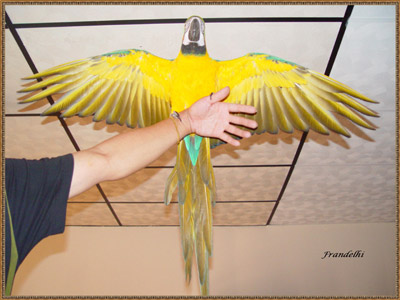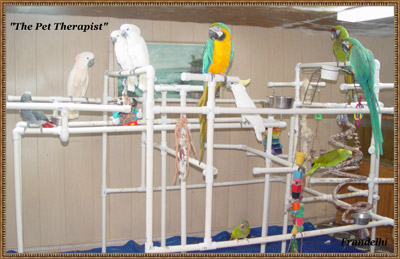THE BIRDMAN OF HUP
THE BIRDMAN OF HUP
Reprinted with permission, University of Pennsylvania Health System
A few years back, Francis Hilario visited his elderly neighbor and brought Porvette, his Blue and Gold macaw, with him. As it turned out, that chance visit not only brought happiness into that woman’s life. It also resulted in a pastime that has brightened the lives of hundreds of other senior citizens. As Hilario quickly discovered, it was a great way “to give back to seniors for all the good things they’ve given us.”
 Hilario, who works as an ED quality coding manager in Professional Fee Abstraction, now makes weekly visits to nursing homes and adult day care centers with his prize-winning cockatoos and macaws — sometimes once, usually two or three times each week. “It is my way of showing gratitude to seniors and showing them the respect they deserve.”
Hilario, who works as an ED quality coding manager in Professional Fee Abstraction, now makes weekly visits to nursing homes and adult day care centers with his prize-winning cockatoos and macaws — sometimes once, usually two or three times each week. “It is my way of showing gratitude to seniors and showing them the respect they deserve.”
All-Around Benefits
Birds have been an significant part of Hilario’s life since childhood. He started breeding show quality homing doves and pigeons while growing up in the Philippines and continued this hobby when he moved to this country in 1992. Today, he has 13 birds, macaws, amazons, and cockatoos — in his home aviary, all of which have names. Some of the names match qualities of the bird itself (I named my Military Macaw ‘Major’). Others are more whimsical. For example, Porvette Royce, as is the bird’s “full name” — is a combination of three cars: Porsche, Corvette, and Rolls Royce.
 According to Hilario, the birds also have distinct personalities. “It’s like having many 3- to 7-year-old kids,” he said. “If one isn’t in a playful mood, I have to separate him from the others.” Hilario’s birds are specially trained to feel at ease with people. He said most can be handled with no problem, but not all of them. “Major will sit on your arm, but don’t try to pet him!” Hilario always treats his audience to a demonstration. When he tells his birds to “Show me your wings”, they spread their wings out wide. “Kiss me” invites, literally, a peck on the lips.
According to Hilario, the birds also have distinct personalities. “It’s like having many 3- to 7-year-old kids,” he said. “If one isn’t in a playful mood, I have to separate him from the others.” Hilario’s birds are specially trained to feel at ease with people. He said most can be handled with no problem, but not all of them. “Major will sit on your arm, but don’t try to pet him!” Hilario always treats his audience to a demonstration. When he tells his birds to “Show me your wings”, they spread their wings out wide. “Kiss me” invites, literally, a peck on the lips.
During each visit, Hilario allows people to hold and pet the birds, who love the attention. He explained that although some people are afraid of the beak, “this is really the bird’s third hand. If a bird grabs you, it’s not to bite, but rather, it is just trying to regain balance.” Some of the birds also demonstrate their talent at mimicking voices. “Porvette calls my son, and my son will think it’s me,” he said, smiling. “He can’t tell the difference!”
Hilario, who is a nurse by profession, said he benefits from these regular interactions as much as the seniors do. “I no longer practice nursing, and I miss the contact,” he said. “Doing this makes me feel like I’m back practicing again.” He has been doing these visits for the past three years, usually in or around the Philadelphia area, but he and some of his feathered friends make an occasional trek to New York as well.
“I’m doing it because it makes me happy,” he said. “And nothing compares with the happiness I see in all those senior citizens’ faces.”


0 Comments